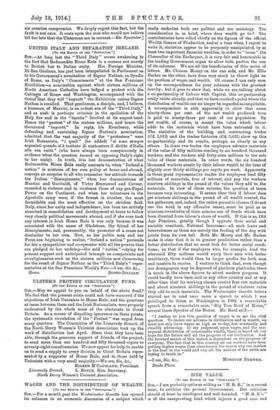UNITED ITALY AND SEPARATIST IRELAND. [To THE EDITOR OF THE
"SPECTATOR...1 Srn,—At long last the " Third Italy " seems awakening to the fact that Redmondite Home Rule is a menace not merely to British but to Italian unity. Her Foreign Minister, Di San Giuliano, has just been interpellated in Parliament as to his Government's nomination of Signor Nathan, ex-Syndic of Rome, as Italy's "Commissario " at the San Francisco Exhibition—a nomination against which sixteen millions of North American Catholics have lodged a protest with the Cabinets of Rome and Washington, accompanied with the thrCat that they will " boycott " the Exhibition unless Signor Nathan is recalled. That gentleman, a disciple, and, I believe, a kinsman, of Mazzini, is an ardent son of the " Third Italy," and as such is particeps criminis in the spoliation of the Holy See and in the "insults" levelled at its august head. Hence the "protest" of the sixteen millions, and hence the threatened "boycott In reply, his Excellency, while defending and sustaining Signor Nathan's nomination, admitted that the vast majority of the " protesters " were Irish Romanists, " i quali" (he added) "si sono sempre segnalati quando si e trattato di contrastare i1 diritto d'Italia alla sna unite," (who have always been conspicuously in evidence when the question turned on opposing Italy's right to her unity). In truth, this last demonstration of what Redmondite Home Rule really amounts to, when "Ireland a nation" is mistress of her own policy at home and abroad, conveys no surprise to all who remember her attitude towards the Italian "Risorgimento," when her denunciations of Mazzini and Garibaldi, of Victor Emmanuel and Cavour, exceeded in violence and in virulence those of any pro-Papal Power on the Continent, and when her volunteers in the Apostolic army were, if the fewest in number, the most formidable and the most effective on the stricken field. Italy, since her unity and independence, has been too actively absorbed in consolidation and development at home to follow very closely political movements abroad, and if she ever took any interest in Irish Home Rule it was only because it was associated with the name of Gladstone, the friend of her Risorgimento, and, presumably, the promoter of a cause not dissimilar to her own. Now, as her public men and her Press are beginning to realize, "Ireland a nation" portends for her a sympathizer and co-operator with all the powers that are pledged to her undoing—the said "nation" relying for present support and anticipated triumph on compatriots and co-religionaries such as the sixteen millions now clamouring for the recall of Signor Nathan as the "Third Italy's" repre- sentative at the San Francisco World's Fair.—I am, Sir &c.,










































 Previous page
Previous page